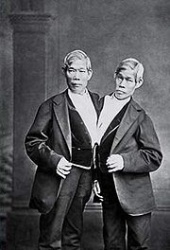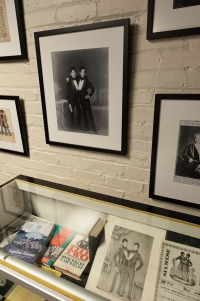-
Hours
Monday - Saturday
9:00 a.m. to 5:00 p.m.Sunday
1:00 p.m. to 5:00 p.m.Closed on Thanksgiving Day and Christmas Day
-
Admission
$10.00 per person
$6.00 for ages 12 & underCombination Admission to
Siamese Twins Museum
and Andy Griffith Museum$16.00 per person
$10.00 for ages 12 & under
Guided Tours $4 -
Location
215 Rockford Street
Mount Airy, NC
27030Across the street from the Andy Griffith Museum
-
Getting Here
Driving directions from your hometown to the Siamese Twins Museum. Once you are here, you can use the Surry Arts Council Venue Map to help you get around town.
-
Parking
Free parking is available in the lot adjacent to the Siamese Twins Museum and across the street at the Andy Griffith Playhouse.
Welcome
From their youth in Siam to a legendary career of entertaining around the world to settling down on farms to raise their families in Mount Airy, the Siamese Twins Museum tells the story of Eng and Chang Bunker with artifacts and interactive displays. Learn more about the history of these world-famous brothers who called North Carolina home.
History

Chang and Eng were born in a village in Siam (now Thailand), on May 11, 1811. They were connected at the chest by a cartilaginous band of flesh. Their father died when they were eight years old, and they helped support their family by preserving and selling duck eggs.
As teenagers, the twins were summoned to the court of King Rama III. Later, the King included them in a diplomatic mission to Cochin. After the trip, they returned home with gifts.
On April 1, 1829, at the age of 18, Eng and Chang left Siam with the approval of the King as well as their mother. They signed a contract with Abel Coffin, an American sea captain, and traveled to Boston, Massachusetts. Over the next several years, the twins were exhibited throughout the United States, Canada, and Europe.
During their extensive travels, Chang and Eng became enormously popular and well-known. They also became more independent. By 1832, Eng and Chang felt they were not being compensated fairly for their work. Having fulfilled the obligations of their contract with Coffin, they declared their independence. For the next several years, they continued to tour, but were self-managed.

In 1839, having amassed a considerable amount of money, Chang and Eng arrived in Wilkes County, North Carolina. After a few months of using a local boarding house as a base for touring as well as personal traveling, they retired from show business and settled down. They built a home and, after a few years, married sisters Adelaide and Sarah Yates on April 13, 1843. Over the years, the families had 22 children.
Eng and Chang and their families moved to Mount Airy in 1854, seeking better farmland and the best possible education opportunities for their children. They were successful farmers and upstanding members of the community. In 1857, they built a second home and began their system of three days in one house and three days in the other. They followed this system rigidly until their deaths.
Chang and Eng were loyal to the Whig party and the Confederate cause, and each had a son who fought in the Civil War. They also opened their homes to Confederate soldiers who were traveling through the area. Following the Civil War, in order to recoup losses and continue to provide education and opportunities for their children, Eng and Chang returned to touring. This time, they were often accompanied by a couple of their children.
The twins died on January 17, 1874, at the age of 62. Their bodies were autopsied at the Mütter Museum in Philadelphia with stipulations their wives had made, including that they not be separated. They were then buried on Chang’s property, where the family could keep guard. Eng’s wife, Sarah, died in 1892, and was buried in an unmarked grave on the family property, near her children who had preceded her in death as well as enslaved people. Adelaide, Chang’s wife, died in 1917. She belonged to White Plains Baptist Church and wished to be buried in the church’s cemetery. At that time, the bodies of Chang and Eng were moved from the family land to be interred next to Adelaide.
Eng and Chang Bunker continue to fascinate the public and are of great interest to researchers in fields ranging from world history and cultures to religion to Asian-American studies to medical ethics.
Other Surry Arts Council Websites
By attending any event associated with the Surry Arts Council, you are acknowledging that an inherent risk of exposure to COVID-19 exists in any public place where people are present. By attending the event, you and any guests voluntarily assume all risks related to exposure to COVID-19 and agree not to hold the Surry Arts Council liable for any illness or injury.

 Surry Arts Council
Surry Arts Council  Historic Earle Theatre
Historic Earle Theatre  Andy Griffith Museum
Andy Griffith Museum  Mayberry Days®
Mayberry Days®